Here’s How The Energy Crisis Turns Into Hunger And Then… War?
We have previously warned about a whopping food crisis and supply problems in the fertilizer market. Well, now is worse because that was BEFORE we had the natural gas crisis. Why is that important?
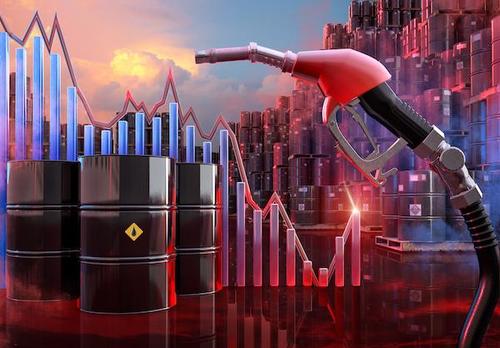
Natural gas is THE critical input into making fertilizer. Urea is essentially ammonia in solid state, the process of which entails reacting ammonia with CO2. And we all now know — thanks to the climate nazis — that CO2 is currently the devil. The problem of course is that with no natural gas there is no urea, and with no urea there is no fertilizer. And with no fertilizer… well, we will eat each other.
Here are the spot urea prices.
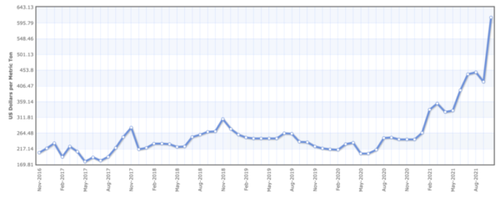
Something else that we had noted some time back (in Korea) but which now seems like a larger problem.
Here is an article about an Australian farmer who warns the urea supply crisis could halt normal life within weeks.
Here’s what he says:
‘Not only will we not be able to grow cattle and we will not be able to grow food and we will not be able to grow grain or anything like that, but even if we could, we can’t move it, because we can’t turn a wheel in a truck because we have no Adblue,’ [AdBlue is needed for diesel vehicles — half of all trucks on Australian roads run on diesel
As of February we might not have a truck on the road in Australia, we might not have a train on the tracks.
‘So quite literally the whole country comes to a standstill as of February.’
The farmer then, goes on to say:
‘Go and have a look in your cupboard and go and have a look in your fridge and I guarantee just about every single item there, at some point, urea has been used to produce that item, whether it’s a steak or a salad or a can of baked beans.
Moving to Europe, we have a full blown energy crisis unfolding there, made worse by increasingly more destructive policies by the pointy shoes (let’s produce more solar and wind when it’s proven to be both inadequate and massively costly) and a supply chain crisis.
Take a look at European energy prices.
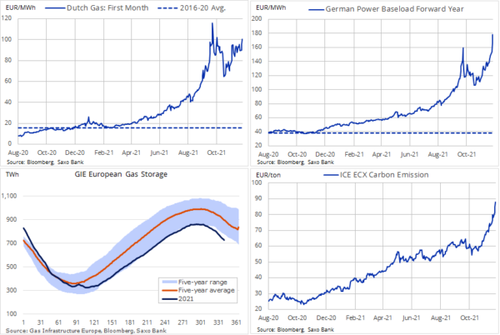
So here we’re now witnessing the beginnings of what promises to be a storm. Think cold and hungry and you’ve got the right picture.
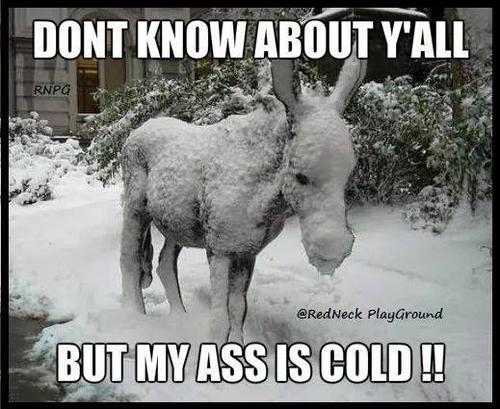
That electricity comes largely from natural gas, and that natural gas comes from those peaky Russkies.
European Gas Prices Surge Above 100 Euros With Eyes on Russia.
Europe’s benchmark natural gas price rose above 100 euros, or $190 per barrel of oil equivalent, ahead of a series of auctions for pipeline capacity that are seen as a test of Russia’s willingness to ease a supply crunch.
The day-ahead auctions for space on Ukrainian pipelines and capacity at Germany’s Mallnow compressor station will provide a strong signal for how serious Russia is about increasing flows to the west. While the region’s biggest supplier has said it aims to keep refilling European storage sites until the end of December, it hasn’t used short-term auctions to ship more fuel.
So right now we have this situation which is going to make your head spin. Europe is out of gas. They’ve spent the better part of the last decade getting rid of their own domestic energy, replacing it with baubles and toys, which, while scoring big on the woke scorecard, have proven abysmal at producing… well, electricity.
With Europeans now cold and very shortly hungry we are due for a war. Remember that historically, the spiraling food prices have caused civil unrest, revolutions, and wars. On the plus side, it has been known to also cure obesity, so there’s that.
Back to urea and food. You can’t make fertilizer without urea and natural gas. As the price of either of these goes higher (both are), it significantly impacts the price of fertilizer. The price of fertilizer impacts in turn the price of food. This is because fert is the second largest cost component of most agricultural production. The first being… you guessed it, diesel.
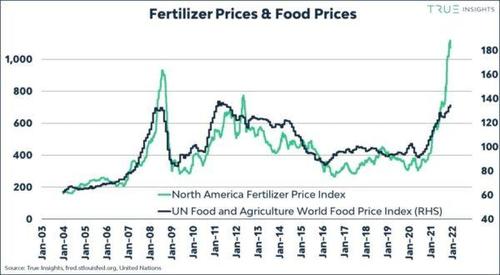
We now have a bull market not just in urea, but in natural gas, and to top it off in diesel too.
To expect food prices to remain stable when the ingredients to producing it are all rocketing higher impresses us as comically stupid.
